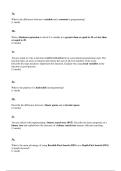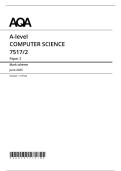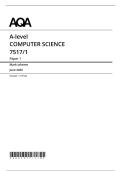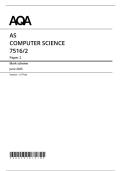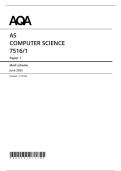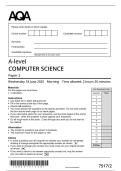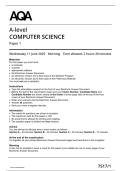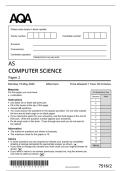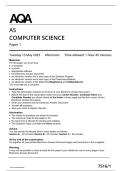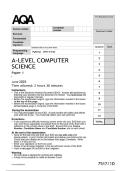AQA • Computer Science
Latest uploads for Computer Science at AQA. Looking for Computer Science notes at AQA? We have lots of notes, study guides and revision notes available for Computer Science at AQA.
-
119
-
3
-
32
Modules Computer Science at AQA
Notes available for the following courses of Computer Science at AQA
- Unit 1 - Fundamentals of programming
- Unit 2 - Fundamentals of data structures
- Unit 3 - Fundamentals of algorithms
- Unit 4 - Theory of computation
- Unit 5 - Fundamentals of data representation
- Unit 6 - Fundamentals of computer systems
- Unit 7 - Fundamentals of computer organisation and architecture
- Unit 8 - Consequences of uses of computing
- Unit 9 - Fundamentals of communication and networking
- Unit 10 - Fundamentals of databases
- Unit 11 - Big Data
- Unit 12 - Fundamentals of functional programming
- Unit 13 - Systematic approach to problem solving
- Unit 14 - Non-exam assessment - the computing practical project
Latest content AQA • Computer Science
Exam for current specification for June 2026 computer science, practice paper containing practice questions with full answers in exam style format.
2025 AQA A-Level Computer Science Paper 2 Mark Scheme2025 AQA A-Level Computer Science Paper 2 Mark Scheme2025 AQA A-Level Computer Science Paper 2 Mark Scheme2025 AQA A-Level Computer Science Paper 2 Mark Scheme2025 AQA A-Level Computer Science Paper 2 Mark Scheme2025 AQA A-Level Computer Science Paper 2 Mark Scheme2025 AQA A-Level Computer Science Paper 2 Mark Scheme2025 AQA A-Level Computer Science Paper 2 Mark Scheme2025 AQA A-Level Computer Science Paper 2 Mark Scheme
2025 AQA A-Level Computer Science Paper 1 Mark Scheme2025 AQA A-Level Computer Science Paper 1 Mark Scheme2025 AQA A-Level Computer Science Paper 1 Mark Scheme2025 AQA A-Level Computer Science Paper 1 Mark Scheme2025 AQA A-Level Computer Science Paper 1 Mark Scheme2025 AQA A-Level Computer Science Paper 1 Mark Scheme2025 AQA A-Level Computer Science Paper 1 Mark Scheme2025 AQA A-Level Computer Science Paper 1 Mark Scheme2025 AQA A-Level Computer Science Paper 1 Mark Scheme
2025 AQA AS-Level Computer Science Paper 2 Mark Scheme2025 AQA AS-Level Computer Science Paper 2 Mark Scheme2025 AQA AS-Level Computer Science Paper 2 Mark Scheme2025 AQA AS-Level Computer Science Paper 2 Mark Scheme2025 AQA AS-Level Computer Science Paper 2 Mark Scheme2025 AQA AS-Level Computer Science Paper 2 Mark Scheme2025 AQA AS-Level Computer Science Paper 2 Mark Scheme2025 AQA AS-Level Computer Science Paper 2 Mark Scheme2025 AQA AS-Level Computer Science Paper 2 Mark Scheme2025 AQA AS-Le...
2025 AQA AS-Level Computer Science Paper 1 Mark Scheme2025 AQA AS-Level Computer Science Paper 1 Mark Scheme2025 AQA AS-Level Computer Science Paper 1 Mark Scheme2025 AQA AS-Level Computer Science Paper 1 Mark Scheme2025 AQA AS-Level Computer Science Paper 1 Mark Scheme2025 AQA AS-Level Computer Science Paper 1 Mark Scheme2025 AQA AS-Level Computer Science Paper 1 Mark Scheme2025 AQA AS-Level Computer Science Paper 1 Mark Scheme2025 AQA AS-Level Computer Science Paper 1 Mark Scheme
2025 AQA A-Level Computer Science Paper 2 Question Paper2025 AQA A-Level Computer Science Paper 2 Question Paper2025 AQA A-Level Computer Science Paper 2 Question Paper2025 AQA A-Level Computer Science Paper 2 Question Paper2025 AQA A-Level Computer Science Paper 2 Question Paper2025 AQA A-Level Computer Science Paper 2 Question Paper2025 AQA A-Level Computer Science Paper 2 Question Paper2025 AQA A-Level Computer Science Paper 2 Question Paper2025 AQA A-Level Computer Science Paper 2 Question P...
2025 AQA A-Level Computer Science Paper 1 Question Paper2025 AQA A-Level Computer Science Paper 1 Question Paper2025 AQA A-Level Computer Science Paper 1 Question Paper2025 AQA A-Level Computer Science Paper 1 Question Paper2025 AQA A-Level Computer Science Paper 1 Question Paper2025 AQA A-Level Computer Science Paper 1 Question Paper2025 AQA A-Level Computer Science Paper 1 Question Paper2025 AQA A-Level Computer Science Paper 1 Question Paper2025 AQA A-Level Computer Science Paper 1 Question P...
2025 AQA AS-Level Computer Science Paper 2 Question Paper2025 AQA AS-Level Computer Science Paper 2 Question Paper2025 AQA AS-Level Computer Science Paper 2 Question Paper2025 AQA AS-Level Computer Science Paper 2 Question Paper2025 AQA AS-Level Computer Science Paper 2 Question Paper2025 AQA AS-Level Computer Science Paper 2 Question Paper2025 AQA AS-Level Computer Science Paper 2 Question Paper2025 AQA AS-Level Computer Science Paper 2 Question Paper2025 AQA AS-Level Computer Science Paper 2 Q...
2025 AQA AS-Level Computer Science Paper 1 Question Paper2025 AQA AS-Level Computer Science Paper 1 Question Paper2025 AQA AS-Level Computer Science Paper 1 Question Paper2025 AQA AS-Level Computer Science Paper 1 Question Paper2025 AQA AS-Level Computer Science Paper 1 Question Paper2025 AQA AS-Level Computer Science Paper 1 Question Paper2025 AQA AS-Level Computer Science Paper 1 Question Paper2025 AQA AS-Level Computer Science Paper 1 Question Paper2025 AQA AS-Level Computer Science Paper 1 Q...
AQA A-LEVEL COMPUTER SCIENCE PAPER 1 JUNE 2025 Python (7517/1D) QP

